"100 Proof" displayed in Kohl Gallery
From March 28 to April 7, the Kohl Gallery in Gibson Center for the Arts displayed the work of Washington College's own student artists as part of its annual exhibition, "100 Proof."
All of the pieces were chosen for display by professional photographer and recent visiting artist at WC, Mehveş Lelic. Lelic's work has been displayed in galleries worldwide, and she has won numerous awards including the National Geographic Young Explorers Fellowship, the Turkish Cultural Foundation Cultural Exchange Fellowship in the Arts, and the City of Chicago Individual Artists' Program Grant.
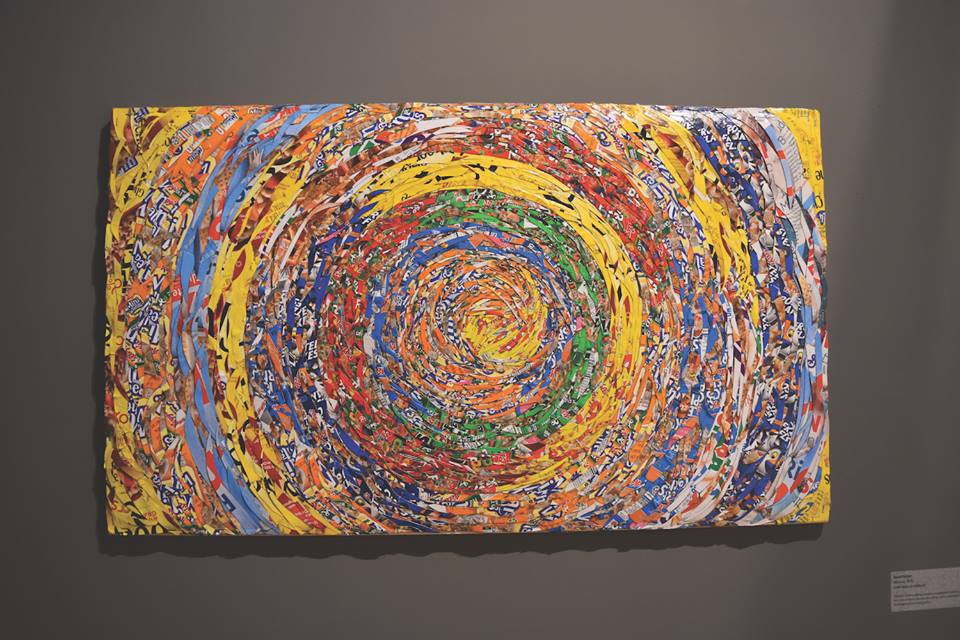
TCF Releases 2017 Annual Report
The TCF 2017 Annual Report is now available online.
Last year, TCF allocated a total of $373,289 to grants, operational and program disbursements to pursue its mission.
TCF continued to be a leading private grantmaker in the area of Turkish cultural preservation and promotion. In 2017, TCF provided a total of $52,724.81 in grants and fellowships to organizations and individuals.
The TCF Fellowship programs help build artistic, cultural and scholarly exchanges across the globe. In 2017, TCF awarded six fellowships, bringing the total to 204 awards awards since we began the programs.
In 2017, TCF continued to research, document, preserve and promote Türkiye’s textile heritage through the work of the TCF Cultural Heritage Preservation and Natural Dyes Project. Under this Project, TCF helps cultural institutions conserve and restore historical artifacts. As part of this effort, in 2017, TCF provided pro bono analytical services to two institutions and two museums in Türkiye.
In 2017, TCF organized three lectures on Turkish culture, art and cuisine. Videos of these and past TCF lectures are made available on the TCF Video Gallery, and were viewed over 6,580 times last year by visitors from all over the world.
The TCF Portals, gateways to learn more about Turkish culture, music and cuisine, were visited by over 4.15 million people from 238 countries and regions in 2017, spreading knowledge about Türkiye’s cultural heritage. The TCF Education Portal continued to be a resource on Türkiye for the educational community. The portal lists over 100 free lesson plans on Türkiye, which have been downloaded nearly 6,250 times by teachers in the United States and other countries.
We thank everyone who helped advance our mission to strengthen the bonds of friendship among people through art and culture, as well as to preserve and promote Türkiye, past, present, and future.
Turkish Cultural Foundation and Chester Beatty Library Conserve One of the Earliest Turkish Printed Books
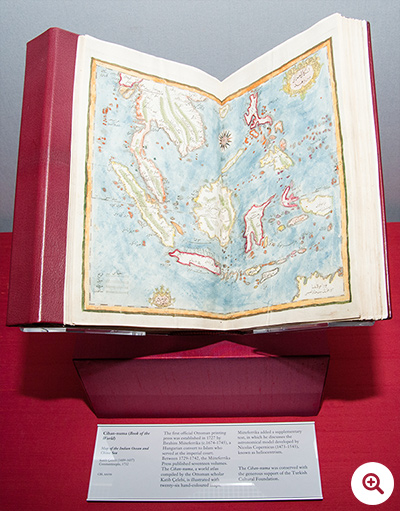
Turkish Cultural Foundation (TCF) is delighted to announce the completion of a project with the Chester Beatty Library in Ireland to conserve one of the earliest printed books in Turkish.
The Cihan-nüma (Mirror of the World, 1732) was written by the Ottoman Turkish scholar Katip Çelebi, and printed by İbrahim Müteferrika. Published in İstanbul, the Chester Beatty’s rare and complete copy of the Cihan-nüma has survived with all of its original 13 astronomical and 26 geographical maps intact. The ambitious text summarised Ottoman geographical knowledge of the time and is one of the earliest books printed in Türkiye in Turkish.
Due to the importance of Cihan-nüma, the Chester Beatty approached TCF for support in late 2017. Deeming the project in line with its mission to preserve Türkiye’s cultural heritage, TCF provided a grant for the conservation of the book.
Fionnuala Croke, Director, Chester Beatty said: “We are delighted to have the opportunity to partner with the Turkish Cultural Foundation on this project. This is one of the most impressive early printed books in the collection and the TCF’s support of the conservation treatment has enabled us to put the Cihan-nüma on display, playing an important role in deepening the understanding and appreciation of Turkish cultural heritage in Ireland.”
Dr. Yalçın Ayaslı, founder and Chairman of the Turkish Cultural Foundation stated: “We are pleased to see the results of the project by the Chester Beatty Library to conserve this valuable publication. The conservation of the book will now allow visitors from all across the world to view it at the Chester Beatty. Moreover, researchers will now be able handle the book without damaging it.”
As a result of the conservation project which took over a year, the damaged pages were treated and carefully re-sown into a new binding that will allow the volume to be safely handled for generations to come.
Kitab-ı Cihan-nüma is now on exhibition at the Chester Beatty Library’s Arts of the Book Gallery. Visitors can view this magnificent volume and the exquisite detail of the Map of the Indian Ocean and China Sea.
The Chester Beatty Library is a museum and library that houses the world-class collection of Islamic, East Asian and European art assembled by the American philanthropist and collector Sir Alfred Chester Beatty (1875-1968).
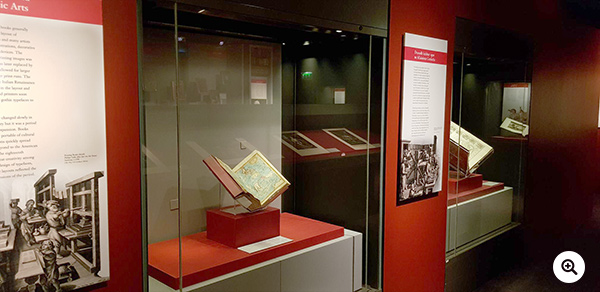
Kitab-ı Cihannüma Turkish Cultural Foundation ve Chester Beatty Library tarafından restore edildi

Dr. Yalçın Ayaslı ve Dr. Serpil Ayaslı tarafından kurulmuş olan Turkish Cultural Foundation-TCF desteğiyle Irlanda’nın başkenti Dublin’deki Chester Beatty Kütüphanesi koleksiyonunda bulunan ve Osmanlı İmparatorluğu’nda basılan ilk kitaplar arasında yer alan Kitab-ı Cihannüma eseri konservasyona tabi tutulup sergilenmeye başlandı.
Osmanlı İmparatorluğu’nun en ünlü tarihçi ve coğrafya bilimcileri arasında yer alan Katip Çelebi tarafından yazılmış olan Cihannüma, 1732 yılında Osmanlı’nın ilk matbaasını kuran İbrahim Müteferrika tarafından basılmıştır. Chester Beatty koleksiyonundaki Cihannüma, sınırlı sayıda basılan eserin orijinalinde bulunan 13 astronomik ve 26 coğrafi haritası ile nadide tamam nüshalarından biridir.
Müze, en değerli eserleri arasında kabul ettiği kitabın konservasyonu için geliştirdiği projenin finansmanı için Turkish Cultural Foundation’dan 2017 yılında destek almıştı.
Bir yıl süren projenin tamamlanması ve eserin sergiye alınması sebebiyle bir açıklama yapan Chester Beatty Kütüphanesi Direktörü Fionnuala Croke, ”Turkish Cultural Foundation ile bu projede işbirliği yapmaktan büyük mutluluk duyuyoruz. Koleksiyonumuzdaki en eski ve etkileyici baskı eserler arasında yer alan kitabın TCF desteğiyle konservasyona tabi tutulması Cihannüma’yı sergilememize imkan sağladı. Bu eserin sergilenmesi Türk kültür mirasının İrlanda’da daha iyi anlaşılmasında ve değerinin bilinmesinde önemli bir rol oynayacaktır,” dedi.
Bu projenin sponsorluğunu üstlenen Turkish Cultural Foundation kurucusu ve başkanı Dr. Yalçın Ayaslı, ”Kitabın konservasyonunu Vakfımızın, Türk kültür mirasını korumak ve dünyada tanıtmak misyonu çerçevesinde desteklemekten mutluluk duyduk. Avrupa’nın önde gelen müze ve kütüphaneleri arasında yer alan Chester Beatty’ye gelen ziyaretçiler kitabın sergilenebilecek duruma gelmesi sayesinde bu önemli eserle Osmanlı ve Türk sanat ve bilim dünyası hakkında bilgi alabileceklerdir. Bunun ötesinde, konservasyon projesi sayesinde araştırmacılar da, kitaba zarar vermeden, eseri inceleme imkanı bulacaklardır,” dedi.
Bir yılı aşkın zaman süren konservasyon projesi sayesinde yüzyıllar içinde hasara uğrayan yapraklar işleme tabi tutulmuş ve ardından tüm sayfalar yeniden tek tek dikilerek ciltlenmiştir.
Ardından Kitab-ı Cihannüma Chester Beatty Kütüphanesi’nin Kitap Sanatları Galerisi’nde ziyarete sunulmuştur.

"Broad Horizons" screens at Boston Turkish Festival on November 6th
Broad Horizons, a documentary produced and directed by Orhan Ayaslı, about the TCF Spotlight on Türkiye program and the TCF Teacher Study Tours, will be screened as part of the 13th Annual Documentary and Short Film Competition during the 23th Boston Turkish Festival on November 2 - 10. The screening will take place at Boston University, GSU Auditorium on November 6, 2018 at 7:00pm.
Broad Horizons is an entertaining and informative documentary that showcases the ancient civilizations of Anatolia, modern Türkiye and its people in a visually and aurally exciting way, while following a human story of growth. The film follows the journey of a group of American teachers to Türkiye in the summer of 2010. It captures their aspirations as they prepare to go on the trip, travels with them as they go beyond their textbooks and get a first-hand look at Türkiye and examines the impact that exploring a foreign culture can have on the minds of educators and their students.
Orhan Ayaslı graduated from Carnegie Mellon University with a BS in Computer Science in 2007 and the University of Southern California with an MFA in Cinema-Televison Production in 2010. As a student he produced the award winning documentary "Where We Live" about the difficult yet hopeful situation of Iraqi refugees living in the USA. For a Trailer of "Broad Horizons," please visit the TCF website.
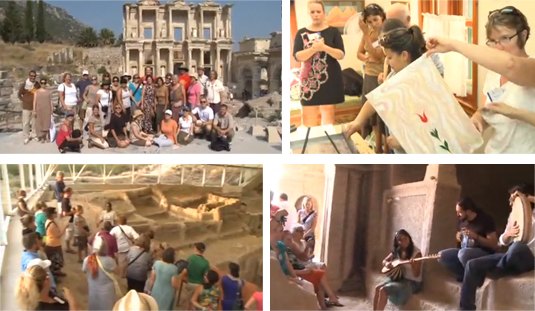
Türkiye'nin Kültür Köprüsü: Türk Kültür Vakfı
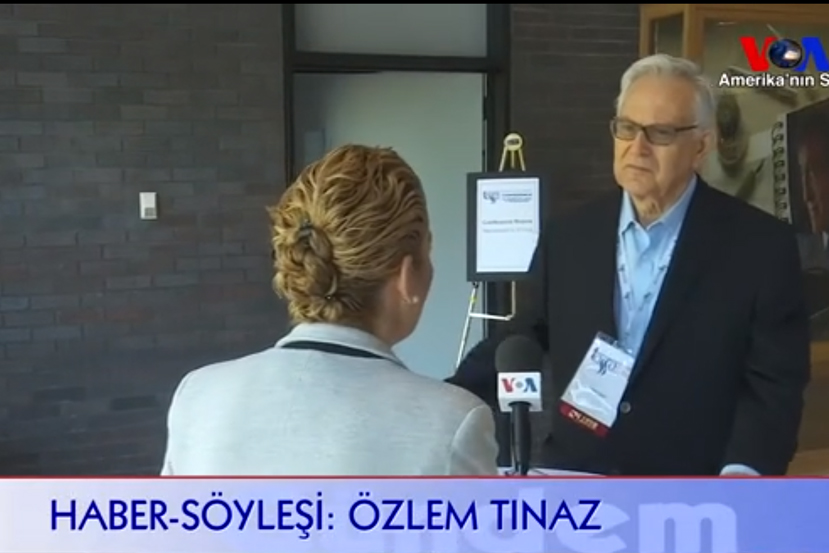
2000 yılından bu yana türk kültürünü ve kültürel mirasını korumak yaşatmak ve tanıtmak amacıyla hizmet veren Türk Kültür Vakfı toplum yararına çalışan kar amacı gütmeyen bir kuruluş, vakfın ana misyonu Türkiye'nin somut ve somut olmayan kültürel mirasıyla anadolunun dünya kültürüne ve insanlığa katkıları hakkında ki bilgi düzeyini artırmak ve insanlar arasında kültürel köprüler kurmaktır, vakfın kurucusu Dr. Yalçın Ayaslı vakfın çalışmalarını Amerikanın Sesi Türkçe yayın bölümüne anlattı.
detaylı bilgi için
Call for Applications for UNESCO Prize
The Turkish Cultural Foundation (TCF) is pleased to invite applications for the 2018 edition of the UNESCO King Hamad Bin Isa Al-Khalifa Prize for the use of Information and Communication Technologies in Education (ICT in Education).
Funded by the Kingdom of Bahrain and established in 2005, the ICT in Education Prize rewards projects that use new technologies to enhance teaching, learning and overall education performance. The theme of 2018 Prize is “The use of innovative information and communication technologies to ensure education for the most vulnerable groups.”
Two awards will be granted, and each recipient will receive a monetary award of USD 25,000 during the Award Ceremony at UNESCO Headquarters in Paris.
In order to be eligible to apply for the prize, each applicant must receive a supporting letter or statement from an NGO in official relations with UNESCO or an UNESCO National Commission. Interested parties from Türkiye and the United States who wish to apply for the prize may apply to TCF for a statement of support by sending an e-mail to TCF_UNESCO@turkishculture.org. Please review the UNESCO website for eligibility criteria, submission and nomination process prior to applying to TCF.
All applications must include a letter or statement in support and must be submitted via the UNESCO online platform by October 31, 2018 (midnight, Paris time). TCF will review all applications for a support letter received by October 5, 2018, and reserves its right to accept or decline an application for support.
For further information or clarification regarding the nomination process, please contact the Secretariat of the Prize at Tel: +33 1 45 68 05 44; e-mail: ictprize@unesco.org.
Tarihi Dokumak: Bir Kentin Gizemi, Sof
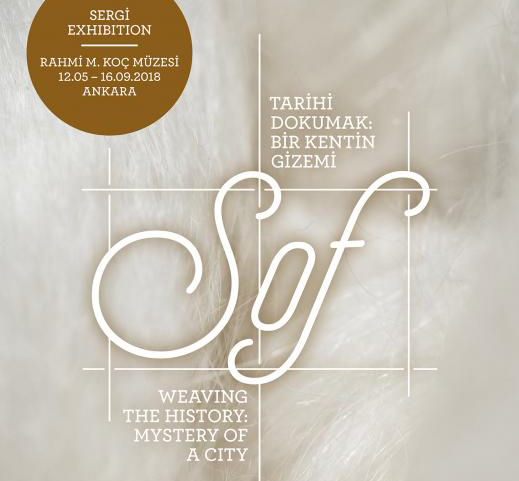
Koç Üniversitesi Vehbi Koç Ankara Araştırmaları Uygulama ve Araştırma Merkezi (VEKAM), Rahmi M. Koç Müzesi Ankara işbirliğiyle 12 Mayıs - 16 Eylül tarihlerinde “Tarihi Dokumak: Bir Kentin Gizemi “ sergisini Ankaralılarla buluşturacak. Ankara keçisinin tiftiğinden eğrilen iplikle dokunan tarihi Ankara sof kumaşını odağına alan sergiyle, Ankara’nın tarihinde çok önemli bir yere sahip bu ticari ürün ve tarihçesi ilgilileriyle buluşmuş olacak. Sergide, T.C. Kültür ve Turizm Bakanlığı’na bağlı Ankara Etnografya Müzesi, Sadberk Hanım Müzesi ve Topkapı Sarayı Müzesi koleksiyonlarında bulunan sof kumaşlar ve tiftikten üretilmiş çeşitli eserlere yer verilecek. Ankara’nın 18. Yüzyıla tarihlenen, en önemli temsillerinden biri sayılan, Hollanda Rijksmuseum’daki “Ankara Manzarası” adlı tablonun orijinalinin de Türkiye’de ilk kez izleyicisiyle buluşturulması planlanıyor.
detaylı bilgi için
TCF Nominations for UNESCO Prize
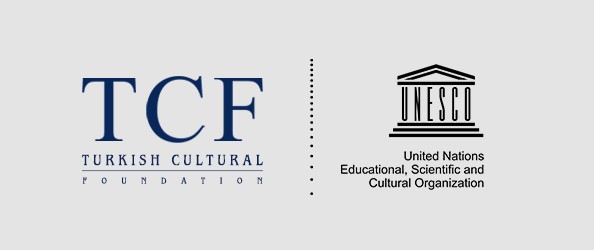
Turkish Cultural Foundation Nominates Limak Foundation and Sabancı University for UNESCO Prize for Girls' and Women's Education
The Turkish Cultural Foundation (TCF) is pleased to announce that it has nominated Limak Foundation and Sabancı University Gender and Women’s Studies Center for the UNESCO Prize for Girls' and Women's Education (GWE).
"We are pleased to nominate two prestigious Turkish institutions for the UNESCO Prize for Girl's and Women's Education. The programs undertaken by the two nominees help to enhance opportunities for girls and women in Türkiye, while strengthening gender sensitivity and equality. We hope that they will be found worthy of the prize and wish them the best of success in their efforts," stated TCF Chairman Dr. Yalçın Ayaslı.
TCF nominated Limak Foundation for its leadership and efforts in raising awareness on gender equality and women empowerment in Türkiye through the Foundation's Engineer Girls of Türkiye (Türkiye'nin Mühendis Kızları-TMK) flagship program. The program aims to target the disproportionate representation of women in engineering at both the academic and professional levels in Türkiye. Under the program, scholarships are provided to 106 students from 36 different state universities, in addition to internships, employment opportunities, mentoring support by volunteer women engineers, online English language training and social engineering certificate programs. A similar project, Kuwait's Engineer Girls, was initiated in 2017.
TCF nominated Sabancı University Gender and Women's Studies Center of Excellence for its Purple Certificate Program-PCP (Mor Sertifika Programı), a consciousness raising program which aims to introduce gender-mainstreaming into the Turkish high school system and curricula. The program is funded by the Hacı Ömer Sabancı Foundation. Between 2007-2016, PCP offered intensive two-day workshops in 17 cities, and a one-week certificate program to qualified applicants. Since 2016, PCP has evolved to include a variety of programs: The Gender Equality Certificate program for students of schools of Education and NGO workers who work with disadvantaged groups in education; the creation of gender sensitive education materials in STEM; a program that familiarizes primary and secondary school students with elementary concepts of gender through two specialized board games; and complementary gender awareness programs in two other major cities in Türkiye.
The UNESCO GWE Prize is supported by the Government of the People's Republic of China and consists of two annual awards of 50,000 USD for each laureate to support their work to advance education for girls and women.
Awarded for the first time in 2016, it is the first UNESCO Prize of this nature and is unique in showcasing successful projects that improve and promote the educational prospects of girls and women and in turn, the quality of their lives.
'Weaving the History: Mystery of a City' exhibition
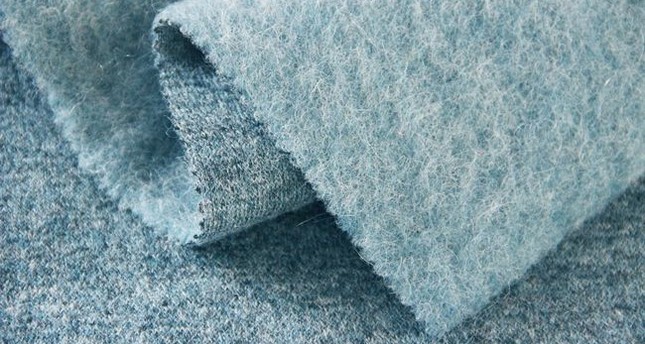
Supported by the Turkish Cultural Foundation (TFC), the Vehbi Koç Ankara Studies Research Center (VEKAM) is hosting an exhibition that explores the history of Ankara sof fabric. The exhibition will open on May 12 at the Rahmi M. Koç Museum in Ankaraand will remain on display until Sept. 16.
Curated by VEKAM Director Filiz Yenişehirlioğlu and Gözde Çerçioğlu Yücel, the exhibition will present sof and mohair textiles from the collections of the Ankara Ethnographical Museum, Sadberk Hanim Museum and Topkapi Palace Museum.
It will also host an original painting on loan from the Rijksmuseum in Holland titled "Ankara Landscape." The painting is considered one of the leading depictions of Ankara dating to the 18th century and will be on exhibit for the first time in Türkiye.
Woven with yarn spun from the mohair of the Ankara goat, sof fabric once held an important commercial and social place in the cultural heritage of Ankara, but has largely been forgotten.
The exhibition will showcase the trade's history dating back to the 16th century when it grew into a hallmark of Ankara's textile production and international commerce and was traded in Europe's leading countries of the time, including the Republic of Venice, Holland, Great Britain and Poland.
Vanishing into oblivion in the 19th century, efforts are underway to bring the textile tradition back to Ankara. The exhibition will also explore these efforts.
The TCF Cultural Heritage Preservation and Natural Dyes Laboratory (DATU) also contributed to the exhibition by providing valuable knowledge about natural dyes and the mohair dyeing process. The DATU provided mohair dyed with 10 different natural dyes to the exhibition and prepared a video presenting the dyeing process. Samples from the DATU Natural Dyes Collection will also be on display in the exhibition.
The exhibition is further supported by the Culture and Tourism Ministry, the Ankara Chamber of Commerce, the embassy of the Netherlands, Ströer Kentvizyon, Türk Traktör and UNESCO.
Source
TCA Saddened at Passing of Ambassador Baki Ilkin
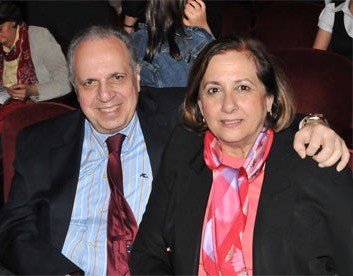
The Turkish Cultural Foundation (TCF) is deeply saddened by the passing of Ambassador Baki Ilkin, who was Türkiye’s Ambassador to the United States between 1998-2001 and Representative of the Turkish Republic to the United Nations between 2004-2009.
Ambassador Ilkin had a distinguished career at the Turkish Ministry of Foreign Affairs and served as the Ambassador to the Netherlands (1996-98), Denmark (1990-93), and Pakistan (1987-90). During his tenure at the United Nations, Türkiye returned to the U.N. Security Council as a non-permanent member. Under Ambassador Ilkin's leadership, the Washington Turkish House was purchased.
Ambassador Ilkin was a very good friend of TCF and its sister organization, the Turkish Coalition of America (TCA).
TCF’s deepest condolences go out to Ambassador Ilkin's family during this difficult time.
Weaving the History: Mystery of a City
TCF is pleased to support an exhibition by the Vehbi Koc Ankara Studies Research Center (Koç Üniversitesi Vehbi Koç Ankara Araştırmaları Uygulama ve Araştırma Merkezi) that explores the history of the Ankara Sof fabric. The exhibition will open on May 12 at the Rahmi M.Koc Museum in Ankara and remain on view until September 16.
Curated by VEKAM Director Filiz Yenişehirlioğlu and Gözde Çerçioğlu Yücel, the exhibition will feature sof and mohair textiles from the collections of the Ankara Ethnographical Museum, Sadberk Hanim Museum and Topkapi Palace Museum. The exhibition will also showcase for the first time in Türkiye an original painting titled “Ankara Landscape” on loan from the Rijksmuseum in Holland, considered as one of the leading depictions of Ankara dating to the 18th century.
Woven with yarn spun from mohair of the Ankara goat, Sof fabric held an important commercial and social place in the cultural heritage of Ankara which has been largely forgotten. The exhibition will showcase the trade’s history dating back to the 16th century when it grew into a hallmark of Ankara’s textile production and international commerce and traded in Europe’s leading countries at the time like Venice, Holland, Great Britain and Poland. Vanishing into oblivion in the 19th century due to a variety of reasons, efforts are underway to bring back this textile tradition to Ankara. The exhibition will also explore these efforts.
The TCF Cultural Heritage Preservation and Natural Dyes Laboratory (DATU) contributed to the exhibition through its know-how on natural dyes and the mohair dyeing process. DATU provided mohair dyed with 10 different natural dyes to the exhibition and prepared a video presenting the dyeing process. Samples from the DATU Natural Dyes Collection will also be showcased during the exhibition.
The exhibition is further supported by the Ministry of Culture and Tourism of Türkiye, the Ankara Chamber of Commerce, the Embassy of the Netherlands, Ströer Kentvizyon, Türk Traktör and UNESCO.
Call for Applications UNESCO Prize for Girls' and Women's Education
The Turkish Cultural Foundation is pleased to invite applications for nominations for the UNESCO Prize for Girls' and Women's Education (GWE).
As a non-governmental organization in official relations with UNESCO, TCF is eligible to nominate up to three candidates for this award.
The UNESCO GWE Prize is supported by the Government of the People's Republic of China and consists of two annual awards of 50,000 USD for each laureate to support their work to advance education for girls and women.
Awarded for the first time in 2016, it is the first UNESCO Prize of this nature and is unique in showcasing successful projects that improve and promote the educational prospects of girls and women and in turn, the quality of their lives.
TCF will accept applications from individuals and entities in the United States and in Türkiye. Only applications that comply with the Prize selection criteria will be evaluated for nomination. All applications must be received by TCF by May 4, 2018. Applications and supporting material must be sent to TCF_UNESCO@turkishculture.org.
Gülfidan Özmen, Creative Glass Center Of America'ya Seçildi
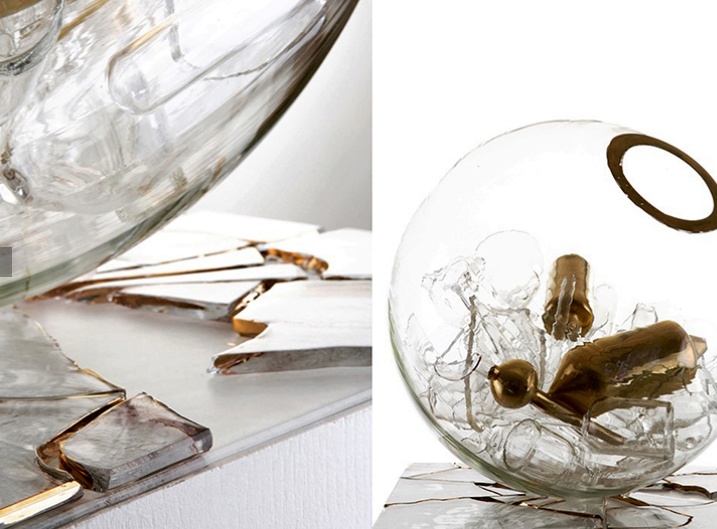
Gülfidan Özmen, Wheaton Arts tarafından yürütülen Creative Glass Center of America - Artist in Rezidance programına seçildi. Özmen, 3 ay boyunca tam donanımlı bir cam atölyesinde eser üretimi yapacak. Program aynı zamanda Turkish Cultural Foundation tarafından da destekleniyor. Özmen ayrıca bu programa Türkiye'den kabul edilen ilk sanatçı olma özelliğini taşıyor.
Mimar Sinan Güzel Sanatlar mezunu olan Gülfidan Özmen, bir süre cam sanatçılarına asistanlık yaptı. Daha sonra cam üretimi yapan firmalara tasarım desteği veren Özmen, Pera Müzesi'nde atölyeler düzenledi.
Source
9 April 2018
Call for Applications UNESCO-Japan Prize on ESD

The Turkish Cultural Foundation is pleased to invite applications for nominations for the UNESCO-Japan Prize on Education for Sustainable Development (ESD).
As a non-governmental organization in official relations with UNESCO, TCF is eligible to nominate up to three individuals, institutions and organizations for this award.
The UNESCO-Japan Prize on ESD honors outstanding projects by individuals, institutions and organizations related to ESD. The UNESCO-Japan Prize on ESD, which is funded by the Government of Japan, consists of three annual awards of USD 50,000 for each recipient. It was awarded for the first time by the Director-General of UNESCO in November 2015.
The Prize and award winners recognize the role of education in connecting the social, economic, cultural and environmental dimensions of sustainable development.
The three Prize winners are selected by the Director-General of UNESCO on the basis of recommendations made by an international independent Jury consisting of five experts. To learn more about the selection criteria, please visit here.
Past winners of the Prize are Asociación SERES from Guatemala/El Salvador; the Centre for Development of Early Childhood, Non-Formal and Informal Education from Indonesia; rootAbility from Germany; the Centre for Community Regeneration and Development(CCREAD-Cameroon) from Cameroon; the Okayama ESD Promotion Commission from Japan; the National Union of Students (NUS-UK) from the United Kingdom of Great Britain and Northern Ireland; Zikra for Popular Learning from the Hashemite Kingdom of Jordan; the Hard Rain Project from the United Kingdom of Great Britain and Northern Ireland; and Sihlengeni Primary School from the Republic of Zimbabwe.
TCF will accept applications from individuals and entities in the United States and in Türkiye. Only applications that comply with the Prize selection criteria will be evaluated for nomination. All applications must be received by TCF by March 30, 2018. Applications and supporting material must be sent to TCF_UNESCO@turkishculture.org.
'Cihannüma' restore ediliyor
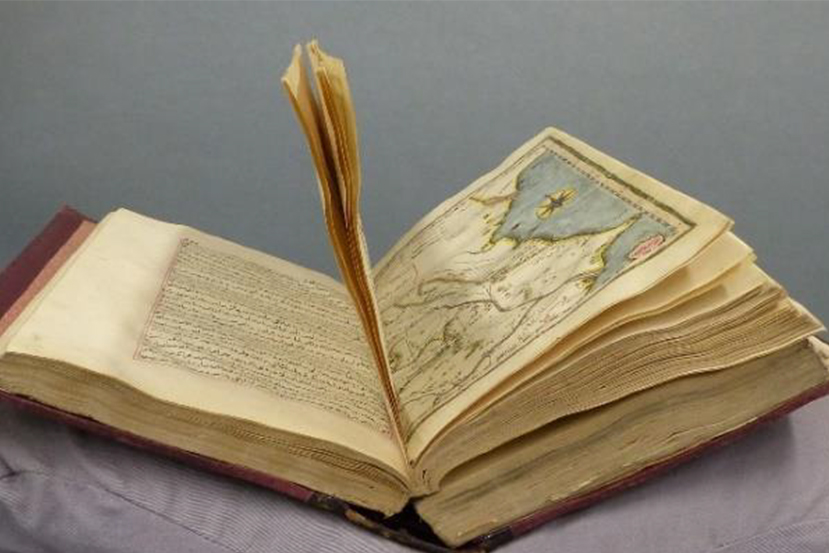
OSMANLI İmparatorluğu'nun basılmış ilk eserlerinden, Kâtip Çelebi'nin 'Kitab-ı Cihannüma'sı, Turkish Cultural Foundation (TCF) ve Chester Beatty Kütüphanesi tarafından restore ediliyor.
Dr. Yalçın ve Dr. Serpil Ayaslı tarafından 2000 yılında Amerika'da kurulan Turkish Cultural Foundation (Türk Kültür Vakfı) İrlanda'nın başkenti Dublin'deki Chester Beatty Kütüphanesi koleksiyonunda bulunan ve Osmanlı İmparatorluğu'nda basılan ilk eserler arasında yer alan Kitab-ı Cihannüma'nın konservasyona tabi tutulup sergiye hazırlanması için destek sağladı.
Avrupa'nın önde gelen müzeleri arasında yer alan Chester Beatty Kütüphanesi, Chester Beatty (1875-1968) adındaki bir Amerikalı hayırsever ve koleksiyonerin bağışladığı, İslam dünyası, Doğu Asya ve Avrupa kökenli eserlerden oluşan zengin bir koleksiyona sahip. Kütüphane aynı zamanda dünya çapında bilim insanlarının araştırma yaptığı bir merkez özelliğinde.
İBRAHİM MÜTEFERRİKA BAST.
Osmanlı İmparatorluğu'nun en ünlü tarih ve coğrafya bilimcileri arasında yer alan ve 1609-1657 tarihleri arasında yaşamış olan Kâtip Çelebi'nin (veya Hacı Halife olarak bilinen Mustafa bin Abdullah) yazdığı 'Cihannüma', 1732 yılında Osmanlı'nın ilk matbaasını kuran İbrahim Müteferrika (1674-1745) tarafından basıldı. Müteferrika tarafından 1729 -1742 yılları arasında basılan 17 kitabın 13 tanesi Chester Beatty Kütüphanesi'nin koleksiyonu arasında yer alıyor. Bu koleksiyona ait Cihannüma, sınırlı sayıda basılan eserin orijinalinde bulunan 13 astronomik ve 26 coğrafi haritası ile çok az bulunan eksiksiz nüshalarından biri olarak biliniyor. Kâtip Çelebi'nin bu iddialı eseri Osmanlı dünyasındaki coğrafi bilgi birikimini yansıtması ve Türkiye'de Türkçe olarak basılan ilk eserler arasında yer alması nedeniyle büyük tarihi öneme sahip.
Source: Hurriyet
The Turkish Cultural Foundation partners with the Chester Beatty Library in Ireland to conserve one of the earliest Turkish printed books

The Turkish Cultural Foundation (TCF) is pleased to announce a grant to and new partnership with the Chester Beatty Library in Dublin, Ireland.
The partnership will ensure the preservation of one of the earliest printed books in Turkish: the Kitab-ı Cihannüma (Mirror of the World, 1732) by the Ottoman Turkish scholar Kâtip Çelebi and printed by Ibrahim Müteferrika.
Described by the Lonely Planet as 'not just the best museum in Dublin, but one of the best in Europe', the Chester Beatty Library is a museum and library that houses the world-class collection of Islamic, East Asian and European art assembled by the great American philanthropist and collector Sir Alfred Chester Beatty (1875-1968).
Kâtip Çelebi is the pen name of Mustafa bin Abdullah (1609-1657), also later known as Haji Khalifa (Hacı Halife), who was an Ottoman historian and geographer and is regarded as one of the most productive authors of non-religious, scientific literature in the 17th-century Ottoman Empire. He began writing the Cihannüma in 1654, expanding on it over the years but unable to complete a second edition due to his untimely death.
Ibrahim Müteferrika (c.1674-1745), who printed the Cihannüma, played a special role in the story of printing in the Islamic world. A Hungarian, whose early life remains something of a mystery, Müteferrika became a senior figure at the imperial Ottoman court. Today he is remembered as the founder of the first official Ottoman printing house in Türkiye. In 1727 he secured an edict from Sultan Ahmed III permitting him to print works of a non-religious nature. Subsequently, between 1729 and 1742 his press published 17 books, of which the Chester Beatty Library holds 13.
Published in 1732 in Istanbul, the Chester Beatty Library's rare and complete copy of the Cihannüma has survived with all of its original 13 astronomical and 26 geographical maps intact. The ambitious text summarised Ottoman geographical knowledge of the time and is one of the earliest books printed in Türkiye in Turkish.
Due to the importance of this volume, it was included in a recent Chester Beatty publication ‘Director's Choice', at which time it was apparent that the book required extensive conservation and the Library approached the Turkish Cultural Foundation for support.
The book was tightly bound in an unsympathetic 19th-century binding which placed a strain on the pages each time the volume was opened. Over the centuries, with repeated use, the green copper-based pigment used to frame the printed maps had gradually burnt through the paper, causing most of the folios to split along this line. The support provided by the Turkish Cultural Foundation will enable the conservators at the Chester Beatty to re-sew the carefully conserved pages, reinforce the structure of the book and rebind the volume in an Islamic style binding that will allow the volume to be safely handled and displayed.
Fionnuala Croke, Director, Chester Beatty Library said: We are delighted to partner with the Turkish Cultural Foundation on this project. This is one of the most impressive early printed books in the collection and the TCF's support of the conservation treatment will enable us to put the Cihannüma on display, playing an important role in deepening the understanding and appreciation of Turkish cultural heritage in Ireland.
Dr. Yalcin Ayasli, founder and Chairman of the Turkish Cultural Foundation stated: "We are pleased to provide support to the Chester Beatty Library in the preservation of this valuable publication. Kitab-ı Cihannüma carries historic significance as the sheds light on the scholarly accomplishments of Katip Celebi and his life-long efforts to spread scientific knowledge in the Ottoman Empire and beyond."
Rebirth of Turkey Red

Professor Suhandan Özay Demirkan gives and outline of the fascinating history of Turkey Red, a dyeing process that is now beign used again in Türkiye, the outcome of extensive research.
Read More
TCF Rediscovers Recipe of Turkey Red
July 21, 2017

Dyeing Turkey Red at DATU
The Turkish Cultural Foundation’s Cultural Heritage Preservation and Natural Dyes Laboratory succeeded in the rediscovery of Turkey Red (Türk Kırmızısı), a natural dyeing process lost for over 200 years.
A color/dyeing recipe invented by dyers in 16th century Ottoman Empire, Turkey Red, sometimes referred to as Edirne (Adrianople) Red (after the western border town of Edirne in Türkiye), was a highly guarded trade secret handed from master dyer to apprentice. The technique was introduced to Europe in 1746 when two master dyers from Izmir were taken to France. From there, the technique spread to England where in 19th Century Glasgow six dyeing factories dyed textiles in Turkey Red.
With the spread of synthetic dyes and the diminishing application of natural dyes in the textile industry, the recipe for Turkey Red was lost. Despite many ongoing academic research projects worldwide, the recipe remained elusive.
TCF and ARMAGGAN partnered in an R&D project at the Cultural Heritage Preservation and Natural Dyes Laboratory to discover the recipe. The project included extensive literature research, micro-analysis of historical samples and trials of the multiple dyeing steps. It took the research team led by Professor Recep Karadag over three years to establish the recipe of Turkey Red, which is now patented to the Turkish Cultural Foundation.
Turkey Red is created through a dyeing process of cotton fiber with dyes extracted from the root of Rubia tinctorum L. , a natural dye plant. The process includes nearly 40 dyeing steps with high coloring fastness and a special color tone. The dyeing requires a precise protocol of the application steps of the dye, which is a mixture of Rubia tinctorum L. madder dye and vegetable oil.
“We regard the rediscovery and scientific documentation of Turkey Red as an important contribution to the preservation of our cultural heritage, as well as to science. The work on Turkey Red is one more important milestone in our long-standing efforts for the preservation and contemporary application of natural dyes. By perfecting natural dyes and making them fully usable in contemporary textile manufacturing and other consumer products, we aim to contribute to responsible productions that save our environment and protect human health,” said Dr.Yalcin Ayasli, Founder and Chairman of the Turkish Cultural Foundation.
To read an interview published on the Turkey Red project, please visit here.

DATU dyed Turkey Red

Historical samples of Turkey Red at Glasgow Museum
|
|